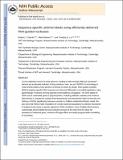Sequence-specific antimicrobials using efficiently delivered RNA-guided nucleases
Author(s)
Citorik, Robert James; Mimee, Mark Kyle; Lu, Timothy K
DownloadLu_Sequence-specific.pdf (636.0Kb)
OPEN_ACCESS_POLICY
Open Access Policy
Creative Commons Attribution-Noncommercial-Share Alike
Terms of use
Metadata
Show full item recordAbstract
Current antibiotics tend to be broad spectrum, leading to indiscriminate killing of commensal bacteria and accelerated evolution of drug resistance. Here, we use CRISPR-Cas technology to create antimicrobials whose spectrum of activity is chosen by design. RNA-guided nucleases (RGNs) targeting specific DNA sequences are delivered efficiently to microbial populations using bacteriophage or bacteria carrying plasmids transmissible by conjugation. The DNA targets of RGNs can be undesirable genes or polymorphisms, including antibiotic resistance and virulence determinants in carbapenem-resistant Enterobacteriaceae and enterohemorrhagic Escherichia coli. Delivery of RGNs significantly improves survival in a Galleria mellonella infection model. We also show that RGNs enable modulation of complex bacterial populations by selective knockdown of targeted strains based on genetic signatures. RGNs constitute a class of highly discriminatory, customizable antimicrobials that enact selective pressure at the DNA level to reduce the prevalence of undesired genes, minimize off-target effects and enable programmable remodeling of microbiota.
Date issued
2014-09Department
Massachusetts Institute of Technology. Department of Biological Engineering; Massachusetts Institute of Technology. Department of Biology; Massachusetts Institute of Technology. Department of Electrical Engineering and Computer Science; Massachusetts Institute of Technology. Synthetic Biology CenterJournal
Nature Biotechnology
Publisher
Nature Publishing Group
Citation
Citorik, Robert J, Mark Mimee, and Timothy K Lu. “Sequence-Specific Antimicrobials Using Efficiently Delivered RNA-Guided Nucleases.” Nature Biotechnology 32, no. 11 (September 21, 2014): 1141–1145.
Version: Author's final manuscript
ISSN
1087-0156
1546-1696